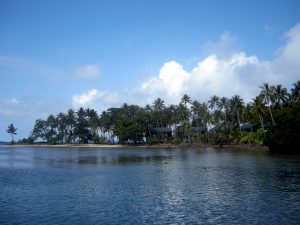Marked by a history of delay, a vote in the Chuuk state on whether to seek independence from the Federated States of Micronesia (FSM) has been scheduled for March 2020. Originally planned to coincide with the 2015 federal elections, the vote on the independence question was pushed back to the 2019 federal elections, then further postponed to March 2020. Chuuk is the largest state in terms of population with around 50,000 inhabitants — almost half of the FSM’s total population. A vote for Chuuk independence would be decisive, as the 45,000 eligible voters are arguably split on the issue. Voter education and awareness have been cited as a reason for postponement.
The prospect of an independent Chuuk is intertwined with Micronesia’s relationship to the United States as well as Chinese geopolitical interests in the region.
The FSM, formerly part of the Trust Territory of the Pacific Islands, which was under U.S. administration until it became a sovereign nation on May 10, 1979, signed a Compact of Free Association with the United States in 1982 that created a close and unique relationship between the two nations. The renewed Compact of 2003, in which the FSM has received over $1.5 billion in economic aid, is set to expire in 2023. The FSM is expected to receive around $82 million before the compact ends.
Calls for independence are rooted in skepticism that Micronesian policymakers have about the benefits Micronesia receives within its Compact of Free Association with the United States. U.S. ambassador to the FSM, Robert Riley, says the compact is a “unique document” that was created as a result of World War II and “it will not be repeated with any other country or any other entity in the world.” It is Chuuk’s prospective diplomatic stature as an independent state that is the main source of debate.
Riley asserts that if Chuuk becomes independent, it will lose critical U.S. support it receives through the compact. Without the compact, all U.S. funding of social programs would be eliminated and Chuuk’s maritime security would be vulnerable. Chuukese citizens would no longer be able to have free movement within the United States, and those living, working, and studying within the United States would be in a state of “legal limbo” and likely sent back home.
But the chair of the public education committee for the Chuuk Political Status Commission, Sabino Asor, stated that “there is no encouraging prospect if Chuuk remains with the Federation.”
Under the compact, the U.S. military has “exclusive access to the airspace and territorial waters of the FSM.” These territorial waters, says senior defense analyst Derek Grossman, are “larger than the continental U.S.” and “are essentially the core of the ‘Pacific’ part of the U.S. Indo-Pacific strategy.” Exclusive access to these waters allows the United States to “project presence into the South China Sea and beyond.” It is this exclusive access that China is working to influence.
If Chuuk state successfully achieves independence, it would be able to make exclusive deals with China. Grossman adds further that “Washington will certainly look to prevent China from accessing this and other geostrategic locations throughout Oceania.” Chuuk is a strategic area militarily; it contains one of the deepest lagoons in the Pacific, which was a Japanese naval stronghold during World War II. China is looking to gain a strategic foothold in the Pacific region and has been making attempts to gain Chuuk’s favor, with Beijing paying $50 million for the China Railway Construction Corporation to build roads in Chuuk along with contributing $2 million to Micronesia’s trust fund.
The region has caught the attention of the United States and in August of 2019, Mike Pompeo became the first U.S. secretary of state to visit the FSM, where he urged the nation to be cautious about China’s growing influence. As both the United States and China vie for influence in the Pacific, uncertainty persists leading up to March 2020 on whether the vote on Chuuk independence will take place, and if it does, what the future of Chuuk’s domestic and geopolitical alignment will be.
Adam Kiedrowski is an independent writer, researcher, and political analyst.

































